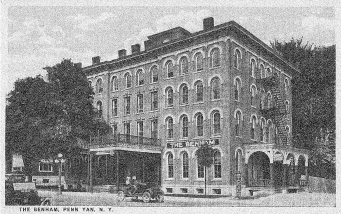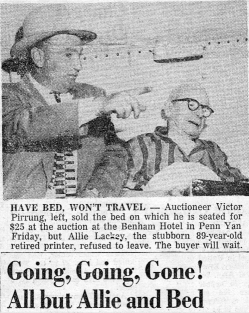|
The Last Man at the Benham
Yates Past March/April 2011
This story was inspired by Penn Yan resident and YCGHS member Dick Eisenhart who did the program at a history luncheon for us in May of 2010. Dick spent many years as the local reporter for the Rochester Democrat and Chronicle. Among the many entertaining stories that he told at the luncheon was the story of Allie Lackey. I talked to Dick about the story afterwards and he gave me the clippings from his 1959 articles on the topic. They formed the basis for this article and are now on file in the Research Room at the Underwood Museum.
 We have been focusing on events of 150 years ago as a part of our Sesquicentennial as well as that of the Civil War. A part of what we’ve been doing is to look back at what was going on in Yates County at the time. Among other things, a major hotel was being constructed on Penn Yan’s Main Street near the business section. The main downtown hotel of the time, the American Hotel, burned down in 1857, leaving the village without a first rate hotel. Editor Stafford C. Cleveland of the Yates County Chronicle complained on March 1, 1860 “for weeks when strangers arrive in town, the only public places they can find to shelter them from the storm are the awnings and sheds in front of the stores. Now after a lapse of two years we are nearly as destitute as ever. An appeal to public minded citizens follows asking them to contribute so that the stigma which now rests on Penn Yan may be removed.” A number of Penn Yan businessmen answered the call and raised part of the money needed for construction of a new hotel and the rest was put up by DeWitt Benham, the son of the first Sheriff of Yates County. Ground was broken on Main Street in August of 1860 and the hotel opened for business in October of the following year under the name The Benham House. The Yates County Chronicle at the time described it as “a large, commodious and elegant building.” For almost a hundred years, the hotel changed ownership and management many times but it remained the finest hotel in Penn Yan. The building was kept up to date with upgrades to heating, lighting, and plumbing. The four-story hotel had fifty guest rooms which were described as light, airy, and well furnished. The main floor had a dining room which could seat 125 people and was known for it’s excellent food. The dining room was the scene of numerous wedding celebrations, private parties and banquets, as well as a meeting place for community organizations. The hotel was the place to put up VIPs visiting Yates County including Theodore Roosevelt and various congressmen. Franklin and Eleanor Roosevelt both spoke there. We have been focusing on events of 150 years ago as a part of our Sesquicentennial as well as that of the Civil War. A part of what we’ve been doing is to look back at what was going on in Yates County at the time. Among other things, a major hotel was being constructed on Penn Yan’s Main Street near the business section. The main downtown hotel of the time, the American Hotel, burned down in 1857, leaving the village without a first rate hotel. Editor Stafford C. Cleveland of the Yates County Chronicle complained on March 1, 1860 “for weeks when strangers arrive in town, the only public places they can find to shelter them from the storm are the awnings and sheds in front of the stores. Now after a lapse of two years we are nearly as destitute as ever. An appeal to public minded citizens follows asking them to contribute so that the stigma which now rests on Penn Yan may be removed.” A number of Penn Yan businessmen answered the call and raised part of the money needed for construction of a new hotel and the rest was put up by DeWitt Benham, the son of the first Sheriff of Yates County. Ground was broken on Main Street in August of 1860 and the hotel opened for business in October of the following year under the name The Benham House. The Yates County Chronicle at the time described it as “a large, commodious and elegant building.” For almost a hundred years, the hotel changed ownership and management many times but it remained the finest hotel in Penn Yan. The building was kept up to date with upgrades to heating, lighting, and plumbing. The four-story hotel had fifty guest rooms which were described as light, airy, and well furnished. The main floor had a dining room which could seat 125 people and was known for it’s excellent food. The dining room was the scene of numerous wedding celebrations, private parties and banquets, as well as a meeting place for community organizations. The hotel was the place to put up VIPs visiting Yates County including Theodore Roosevelt and various congressmen. Franklin and Eleanor Roosevelt both spoke there.
By the 1950s the building, although well maintained over the years by its various owners, was starting to show its age. The last owners, Mr. and Mrs. Harvey Hirsch, sold the building in 1959 to the Lincoln Rochester Trust Company who made plans to raze the old hotel and build a new bank building on the site (now the Community Bank). The owners, who had an apartment in the hotel, notified all residents that the contents of the building would be auctioned off in April of 1959 and the building demolished in August. Refusing to believe the notice was 89 year old Allie Lackey who made no plans to vacate his room. Lackey was a retired printer from Rochester who had retired to Dundee. After breaking a hip and being hospitalized for three months, he moved into the Benham Hotel early in 1958. As the time approached for the auction of the contents of the hotel fourteen months later, the owners started to put pressure on Lackey to leave. They refused to take the harsh measures of cutting off his heat, lights, and meals being delivered. Instead they raised his rent to $10 a day. He refused to pay. They then ordered the hotel handyman to cut off delivery of cigars to Lackey’s room. He had a three cigar a day habit and they hoped that this would force him out of his room in order to go out and buy some. Then the owners could lock the doors. That didn’t work either. Finally the owners took legal measures and served him with an eviction notice. He replied by saying if they want him in court, they would have to hold it in his room.
 In late April 1959, the auction was held at the Benham Hotel. When the auctioneer got to the contents of Allie Lackey’s room, the bed had to be auctioned off with Lackey still in it. The man who paid $25 for the bed and other contents of the room, said that he was willing to wait until Lackey was out of it before picking up his purchase. That didn’t happen right away as he held out in his room. Sympathetic people continued to supply him with food and cigars. As the date for razing the building approached and before force had to be used to remove him, Allie Lackey left the Benham Hotel on his own volition and was soon situated in a local nursing home. He died there in November of 1960 at the age of 90. In late April 1959, the auction was held at the Benham Hotel. When the auctioneer got to the contents of Allie Lackey’s room, the bed had to be auctioned off with Lackey still in it. The man who paid $25 for the bed and other contents of the room, said that he was willing to wait until Lackey was out of it before picking up his purchase. That didn’t happen right away as he held out in his room. Sympathetic people continued to supply him with food and cigars. As the date for razing the building approached and before force had to be used to remove him, Allie Lackey left the Benham Hotel on his own volition and was soon situated in a local nursing home. He died there in November of 1960 at the age of 90.
The destruction of the Benham Hotel in August and September of 1959 provided some insight for those interested in mid-19th century architecture and construction techniques. Frank Swann, Yates County Historian at the time, wrote this for the September 17, 1959 Chronicle Express: “Several curious old time methods of construction have been disclosed by Joe D’amico and his wreckers as the old Benham House is practically down to bare earth. Over the dining room, supporting the ceiling and upper floors were two arched beams of cast iron, perhaps 28 feet long. These were brittle and broke easily as the contractor’s bulldozer dragged them from the building. In fact one beam was already broken and in a few years would unquestionably have caused real trouble. These arched beams weighed about 1,500 pounds each and were possibly the product of the old Commercial Iron Works then located not far away. Heavy wooden timbers about 8 by 12 inches supported the beams, that suggested modern steel I-beams. Ornamental caps over many of the windows that appeared to be of plaster actually were cast iron. Several of them have already been sold to local persons who propose to make pairs of “Benham bookends.”
Others in the community bought batches of brick, stone, and other salvaged articles. Thus the Benham, along with Allie Lackey, became part of our county history.
By Rich MacAlpine
|
